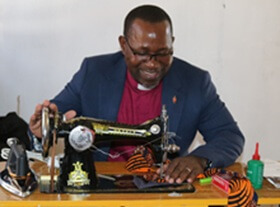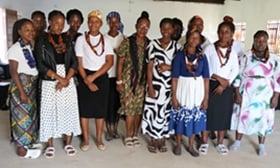In an area marked by rural poverty, poor access to education and a lack of opportunities for girls, a light of hope has been ignited in the spirit of the United Methodist mission. In May 2025, the village of Bela-Vista experienced a historic moment, with the official launch of the Cutting, Sewing and Cooking Project, an initiative of United Methodist Women in Mozambique.
The project aims to provide technical and life skills to girls in vulnerable situations, preparing them for life and the job market. The initiative comes as a response to the harsh realities faced by many girls in the region, such as early marriages, early pregnancies, poor access to technical education, and the lack of basic infrastructure, such as drinking water, transportation and stable electricity.
Although the social integration of girls in Mozambique faces significant challenges, there are efforts by the government, social organizations and churches to promote gender equality and female empowerment. The Mozambican Constitution and public policies recognize equal rights, but in practice, women and girls still face barriers.
Empowerment through training
Rute Uetela Uthui, Executive Secretary of Women in the Mozambique South conference of the United Methodist Church, highlighted the fundamental role of community training, explaining, “We are training girls not only in practical skills, but also in values. This support will contribute to the recovery of moral values, cultural identity aspects of their livelihood and respect for human dignity.”
Rute deeply thanked United Women in Faith for its funding and The United Methodist Church in Mozambique for embracing the expansion of the project in the Bela-Vista region, a quiet and poor town located 105 kilometers from the city of Maputo, the capital of Mozambique.
She also stated that the project is very attractive, and dozens of women and young people continue to arrive for training. The project already has more than 50 trainees.
Ana Jossai, representing the Neighborhood Secretary, expressed gratitude for the initiative, observing, “This project is a source of hope and transformation in Bela-Vista. Many teenagers here live in difficult conditions that affect their academic and personal growth. We commend the initiative of The United Methodist Church.”
Trainees benefit from the knowledge they gain through the Cutting, Sewing and Cooking Project in Bela-Vista, Mozambique.
The General Coordinator of the Women in Faith Programs in Mozambique, Angelina Mbulo, said that their organization acts based on the needs presented by the United Methodist Women's Organization in Mozambique. In addition to dressmaking, Women in Faith currently implements pig and chicken projects. She added that there are women who participated in these courses, graduated, and have launched their own businesses, allowing them to pay for their children's uniforms and other family expenses.
Mbulo also assured that the partnership between Women in Faith and United Women in Faith transforms the lives of women, young people and children in area communities and that they will continue to work together.
Trainees experience a new lifestyle
Anabela Nzualo, a beneficiary of the project and representative of the trainees, expressed her satisfaction with the initiative. She shares, “Before this project, many of us did not know what to do with our future. Some had dropped out of school, others were facing difficulties in our families and had no prospects. But today, we confirm that we are not alone. We feel that we are valued, that we have capabilities and that we can achieve our dreams.”
The trainees promised to seize this opportunity with responsibility and dedication. And, in the future, they also intend to help other girls discover their value and purpose.
Délia Sambo, the General Councilor of Methodist Women, celebrated community-based initiatives that build a future with solid foundations. She committed to continue supporting these initiatives, and reinforced a strategic vision, saying, “This is more than a course. It is a plan for social and spiritual liberation. Sewing and cooking are not just crafts, but paths to dignity, self-esteem and autonomy.”
The Women’s South Conference President, Almera Gune, highlighted the organization’s commitment to social impact, explaining, “When we empower girls, we fulfill our spiritual and civic role, and through sewing and cooking, we want to open doors for entrepreneurship in underprivileged communities and income generation, and we will continue to do our part to help those in need.”
Martins Simbine, pastor of the Bela-Vista Church Extension, welcomed the arrival of the project in the community, sharing, “This is a new day for Bela-Vista. This project will reveal hidden talents and inspire many girls. Traditional and contemporary clothing and cuisine will be produced here, with the goal of not only learning, but also creating income-generating opportunities.”
Reverend Bernardo Victorino Bernado, The Superintendent of the Maputo City Area, expressed his gratitude for the honor of welcoming the project into the area he supervises and encouraged the trainees to see these courses as a foundation in their lives. He said, “We are not just offering courses, but igniting hope. These teachings will bear lasting fruit.”
The church has a role in community development
The initiative’s launch event was attended by local authorities, community leaders, trainers and beneficiaries. During the ceremony, Bishop João Filimone Sambo highlighted the importance of programs that go beyond spiritual support, promoting practical and sustainable development in communities.

Bishop João Filimone Sambo displays his own sewing skills at the launch of the Cutting, Sewing and Cooking Project in Bela-Vista, Mozambique.
“My sisters and brothers, as you can see, despite the fact that this is a United Methodist project, the reality is that the house of God is for everyone, and hence it is like a school which does not care where you came from to enroll, this is also our common home, irrespective of the denomination you belong! It is the light that inspires the world,” he said.
Bishop Sambo also urged the trainees to use and take good care of the project’s machines so that the other beneficiaries find them in good condition. He asked the trainees to continue to spread the word and invite others in the community and those from other denominations to join the project’s training. He challenged the trainees to use what they will learn responsibly and to share their knowledge with other girls in the community.
“With these tools, we hope that they will leave with more than just certificates, that they will take with them the determination to transform their lives and communities. We hope to replicate this experience throughout the country,” he concluded.
Roque Facela is a Communicator from Mozambique. This story was adapted by Ezequiel Nhantumbo, the UMCom lusophone correspondent in Africa, based in Maputo.
This page was published on July 8, 2025. The contact for this story is Laura Buchanan.






